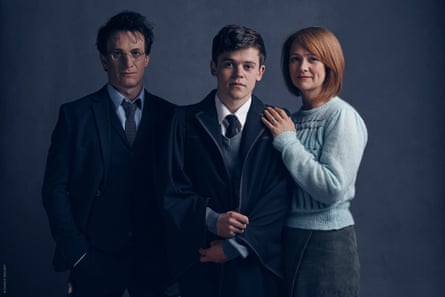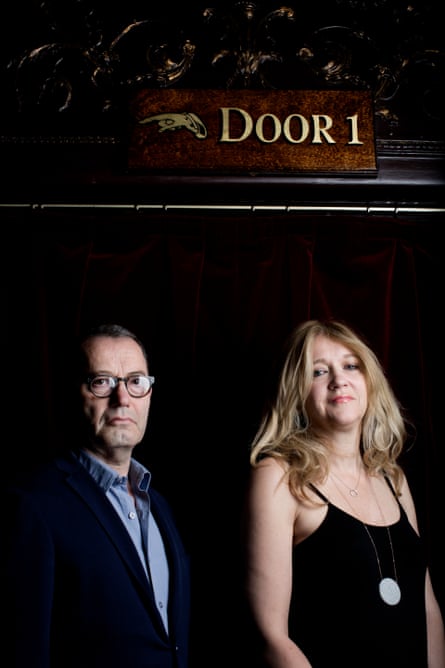During previews of her latest West End show, theatre producer Sonia Friedman has developed an analogy for the pressure she is feeling. “Imagine Star Wars was opening in one cinema in one city and that was the only place you could see it. That’s sort of what’s happening with this. The amount of interest worldwide is that much.”
Though playing in just one venue, the Palace theatre, in one city, London, Harry Potter and the Cursed Child offers two opportunities for fans to fight for a ticket. Dramatist Jack Thorne has written a pair of instalments, each two and a half hours long, based on several major characters in JK Rowling’s seven novels, which became eight movies.
While still about the superstar wizard, the plays introduce multiple new figures and plot lines. And if I said much more than that, one of Rowling’s fearsome dementors would descend and suck out my soul.
Talking to Friedman and her co-producer, Colin Callender, in the Palace bar, I’m wearing two lapel badges with the legend #keepthesecret, handed to theatre-goers as they leave each part. This is because Rowling, whose character Voldemort was infamously known as He-Who-Must-Not-Be-Named (and may or may not appear on stage), has decreed the Harry Potter plays should have The Plot That Must Not Be Mentioned.
Callender was impressed by the defence given by John Tiffany, the show’s director. “He said: ‘Why would you open a kid’s Christmas present in November?’ Which is a lovely metaphor.”
“It’s extraordinary that, six weeks into previews, the story still isn’t out,” says Friedman. This is partly due to the willingly zipped lips of audiences and newspapers. While you could plot-spoil The Mousetrap by standing outside the theatre and shouting the surprise identity of the murderer, the Potter plays are so complex – especially the second one – that a killjoy would need to give a half-hour lecture with diagrams.
So secretive has the preview period been there are stories of tweet-eaters being sent out into cyberspace to close down an Albanian fan who heard something from a cousin in London. Is that true? “No,” Friedman insists. “The only tweets we have closed down have been racist.” His dismayed head shaking in time with Friedman’s, Callender adds: “Some really ugly stuff about Noma being cast as Hermione.”
Though otherwise keeping stumm about the production, Friedman is prepared to say what the show isn’t: “What’s interesting is that there has been an immediate assumption, from anyone who hasn’t done their research, that this is a musical. People still call it Harry Potter: The Musical! And I think that’s because it’s usually the form in which franchises and big musicals are seen.”
“Or, otherwise, they think it’s the books adapted for stage,” says Callender. “What Thorne and director John Tiffany have done, it can probably be safely said, is to push every element – emotion, adventure, magic – to the maximum.
The plays explore two empty spaces in the Potter story. What happened after the seventh book – Jamie Parker, Noma Dumezweni and Paul Thornley play Harry, Hermione and Ron as 40-year-olds with Hogwarts students of their own – interacts with a new perspective on a key moment in Harry’s childhood. The key to the drama – including a three-hanky scene in the second play that still makes Callender well up as we discuss it – is the wizard’s status as an orphan.

“Yes,” says Friedman. “The first thing Jo [Rowling] said to us was ‘Harry the orphan’. The starting point was: how does a 40-year-old man, who’s also an orphan and a wizard and one of the world’s greatest heroes, how does he do the most basic thing of being a dad when he’s had no parenting experience and actually had quite a lot of abuse.”
As the title warns, it is the darkest of all the Potter projects – the “cursed child” could be a reference to any one of several characters. The chills, however, will be punctuated by gasps of surprise at a succession of ingenious illusions. The production wants to prove that theatre can compete visually with CGI technology.
“It does,” says Friedman. “And the gasps are great to hear. But the magic and illusions are so simple – most of them could have been done in Victorian theatre. Or in Trafalgar Square. We deliberately wanted no David Copperfield or Siegfried & Roy-type magic.”
The box office regularly releases cheaper tickets in the hope of keeping the show family-affordable. Devices to prevent mass online purchase by electronic diallers or bots have kept the secondary ticket-sales market small, though Friedman thinks this is partly due to the demographic. The banker types who were willing to pay thousands to see Benedict Cumberbatch’s Hamlet or Nicole Kidman in Photograph 51 are not potty for Potter.

“Over 50% of our audience are first-time theatre-goers,” says Callender, with Friedman adding: “And over 50% of our audience – again, unusual – is under 35. Which is genuine audience development for our industry.”
They finish each other’s sentences like a long married couple, but there are presumably creative disagreements between the pair and Tiffany, Rowling and Thorne. So who has the final veto? “It’s never come to that,” says Callender. Seriously? “We have never disagreed about one thing,” Friedman insists.
If a dispute did arise, the casting vote would surely go to Rowling? Callender says: “Yes, if it had to do with the Harry Potter canon, then all of us would want to defer to Jo.” If it’s about anything on stage, it’s John Tiffany.” “And,” Friedman laughs, “if it’s a production issue, Colin and I will just slug it out in the car park.”
During the rehearsal period, Jack Thorne became a father for the first time. Given Potter’s pulling power, it seems a strong chance that The Cursed Child will still be running when his child is old enough to see it. Friedman refuses to speculate about how long and how far the show might go. “Colin and I are ridiculously superstitious. We won’t even think about what happens next until after the opening night.”
- Harry Potter and The Cursed Child: Parts 1 and 2 opens at the Palace Theatre on 30 July.
This article was amended on 21 July 2016 to correct the misnaming of dementors as death eaters in the third paragraph.

Comments (…)
Sign in or create your Guardian account to join the discussion